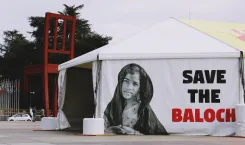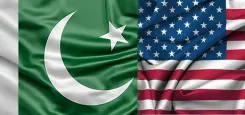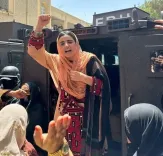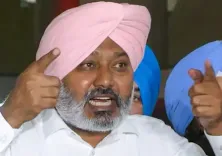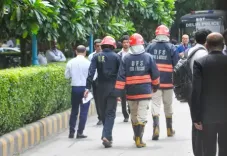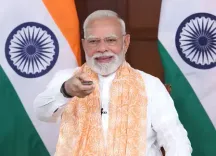Is Nepal's first-ever woman Prime Minister a sign of change?
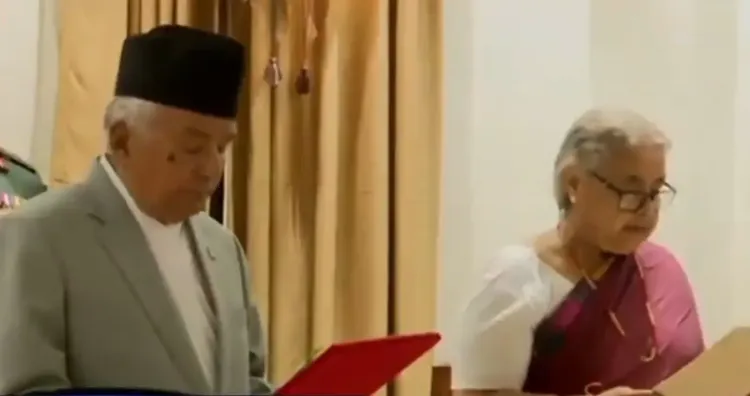
Synopsis
Key Takeaways
- Sushila Karki is Nepal's first female Prime Minister.
- Her appointment follows significant youth-led protests.
- She previously served as Chief Justice, ensuring constitutional protection.
- Challenges include uniting diverse stakeholders and addressing public demands.
- Her role may symbolize a shift towards greater female representation in politics.
Kathmandu, Sep 12 (NationPress) Sushila Karki, 73, took her oath as Nepal's interim Prime Minister late on Friday, marking a historic moment as the first-ever female to assume this role in the Himalayan nation.
Karki, who previously served as the country’s first female Chief Justice, received her oath from President Ram Chandra Poudel, following extensive discussions with leaders of the Gen-Z protests, constitutional scholars, and military officials throughout the day.
The appointment came after the downfall of KP Sharma-Oli’s government amid violent protests led by the youth, who voiced their discontent against Oli's administration.
Negotiations with Gen-Z activists and other stakeholders revolved around whether to dissolve the House of Representatives prior to or after the new Prime Minister's swearing-in.
Activists endorsed Karki’s candidacy, paving her way to become Prime Minister, despite other non-political names being considered.
Nevertheless, there is no constitutional provision that permits anyone outside the House of Representatives to hold the position. Karki's appointment was made under the “principle of necessity”.
According to Article 76 of Nepal’s Constitution, only a member of the House of Representatives may become Prime Minister, which renders Karki unqualified since even National Assembly members are barred from the role.
Moreover, Article 132 (2) of the Constitution disallows anyone who has previously held the office of Chief Justice or Supreme Court Judge from being appointed to any governmental position, apart from exceptions noted in the Constitution.
“Her appointment relies on the principle of necessity, a concept practiced repeatedly since the 1950 revolution,” explained Bipin Adhikari, a constitutional lawyer. “However, this principle does not equate to the rule of law. If we disregard the Constitution for one reason or another, it cultivates a habit of violation, which could lead to more significant issues in the future,” he highlighted.
Adhikari did commend Karki’s track record of constitutional protection during her tenure as Justice and Chief Justice, provided the arrangement is temporary and power transitions to an elected government after new elections.
Karki's selection as Prime Minister has received widespread approval across Nepal.
Former Chief Justice Kalyan Shrestha, who preceded Karki in 2016, expressed confidence in her integrity and ability. “While I cannot evaluate her political leadership, I have witnessed her judicial leadership, and she is reliable,” stated Shrestha.
Former Prime Minister Baburam Bhattarai also endorsed Karki's appointment, labeling it a positive move as the youth of Gen Z have selected her to lead a new Nepal. “She deserves full national support and cooperation. We extend our congratulations and support to her,” he remarked in a press statement.
Adhikari praised Karki's “integrity” and “capability,” but raised concerns regarding her ability to unify stakeholders in the current uncertain climate. He underscored the need for her government to conduct elections within the required timeframe and ensure justice for those responsible for the deaths of young protestors and the destruction of property.
A local media report citing Nepal Police confirmed the deaths of 51 individuals, including some security personnel, during the Gen-Z protests, which resulted in extensive damage to both public and private properties, including businesses. “Specific actions must also be taken to cater to the Gen-Z protestors’ demands for corruption reform and good governance,” Adhikari noted.
Karki was born in 1952 into a middle-class family in Morang District’s Biratnagar in eastern Nepal. At a time when few girls received an education, her parents motivated her pursuit of learning.
Coming from a politically active family, her father, inspired by B P Koirala, Nepal's first elected Prime Minister, joined the Nepali Congress. Karki earned her Bachelor's degree in law from Tribhuvan University in 1972 and completed her Master’s degree in political science in 1975 from Banaras Hindu University in India. Afterward, she began her law practice in Biratnagar in 1979.
She became a senior advocate in 2007. In 2009, she was appointed an ad-hoc judge in the Supreme Court and was promoted to a permanent judge in November 2010. In April 2016, she was named Chief Justice of the Supreme Court.
As Chief Justice, Karki delivered a pivotal ruling in January 2017, disqualifying the then-powerful anti-corruption chief Lok Man Singh Karki, accused of abusing his power to intimidate politicians, bureaucrats, and businessmen.
However, her position on another controversial case drew criticism when her decision regarding the appointment of a police chief opposed the coalition government led by the Nepali Congress and CPN (Maoist Centre), leading lawmakers to initiate an impeachment motion against her. She faced a brief suspension until the Supreme Court invalidated the impeachment and reinstated her as Chief Justice.
Previously, in 2012, as a Supreme Court justice, she sentenced then-serving minister Jaya Prakash Gupta on corruption charges.
Karki's husband, Durga Subedi, was a Nepali Congress leader who participated in Nepal's first-ever plane hijacking in 1973, aiming to fund the party's armed resistance against the autocratic Panchayat regime. The hijacked Royal Nepal Airlines plane was targeted after reports indicated it was transporting a significant amount of cash.


